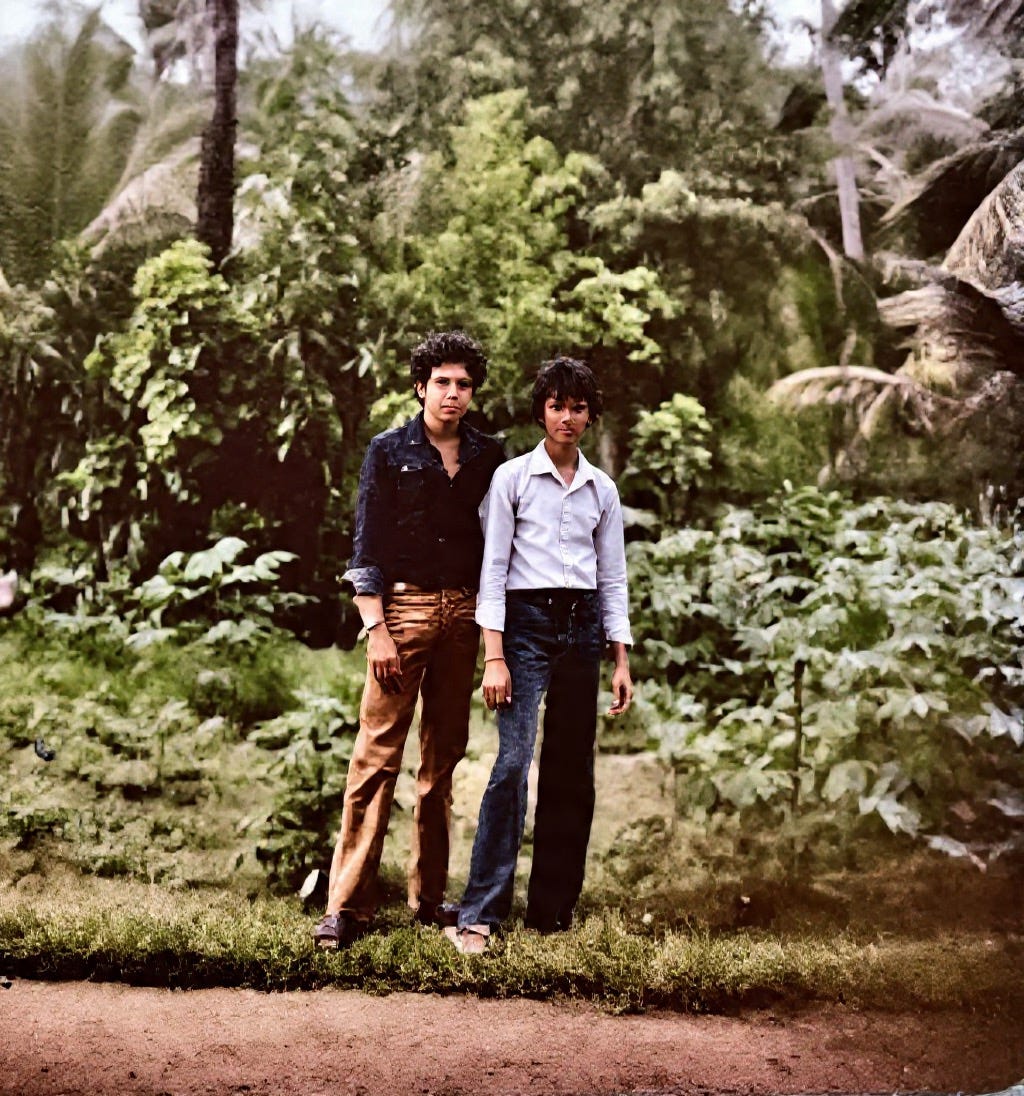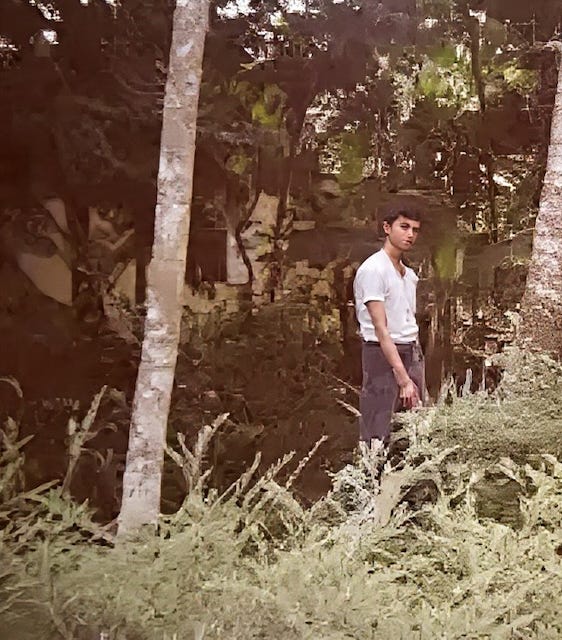The Boy Who Dared the World
The Boy Who Dared the World
Timeless, symbolic of the bond that endures.
The summer of 1973 arrived in Dalugama like a heavy sigh.
It clung to the skin — the mingled scent of salt and coconut oil, sun-baked earth, and damp canal water. I was eighteen, having just finished school and entered that uneasy space between childhood and what came after. The streets shimmered with heat, the radio at the corner store played the same familiar hits. Everything was ordinary, yet I felt a quiet tremor of possibility.
Ajith appeared in that tremor.
He was sixteen, smaller than me, yet he moved through the world as if daring it to catch him. A cousin of friends, a familiar face from junior school in Wattala, he would appear unannounced at our house — and I found myself looking forward to his visits with a quiet mixture of anticipation and curiosity.
Sometimes he borrowed clothes. Sometimes he asked for a cup of tea. Sometimes he simply sat on the verandah steps, restless as the summer itself. Perhaps it was I who encouraged him — opening my home, and my heart, to a beautiful friend. Maybe my younger self recognised, even then, the flicker of vulnerability behind his easy charm.
My mother — quiet, unassuming, infinitely patient — received him without question. She never interfered, yet her presence created a sanctuary. She treated him as though he belonged, though he was always a visitor — a flash of light in the measured rhythm of our home.
We met one afternoon near the Catholic church. Ajith was balancing on the pews, laughing in a way that made my chest tighten.
“Machang,” he called, “you want to try?”
I shook my head. Laughed instead. That laugh — nervous, uncertain, hopeful — was the first thread that would bind us together.
The summer unfolded in small, trembling gestures. Ajith came often. He told stories of friends who had left overseas to work on ships, of distant places I could only imagine. I listened — not because I shared his dreams, but because I wanted to be part of the world he inhabited.
We rode bicycles, sometimes mine, sometimes his cousins. Knees knocking, arms brushing, the sunlight glinting on bare shins — a foolish, uncontainable happiness.
I began to notice him not only as a friend but in ways I could not name. His laughter, the way his hair caught the sunlight, the careless brush of his hand against mine — it all set something alive inside me. Desire, affection, and that fragile fear of losing him — all at once.
When he invited me to his home in Gonawela, the contrast was stark. His father indifferent, his siblings lively and noisy — the little world of Ajith was both wild and fragile. I watched him navigate it, fierce and unguarded. I admired him, worried for him, wanted him close. It was never simple. Nothing about Ajith was.
There was also his younger sister — a bright, curious girl of thirteen, with a laugh that filled the room. Something in her reminded me of the first stirrings of beauty and possibility. I found myself watching her once or twice, fascinated by her grace, and then stopped — aware of the boundary that must never be crossed. It was innocence, nothing more, and I kept my distance.
We both went for dancing, mostly at friends’ parties — barefoot evenings under coloured lights, transistor radios blaring the latest hits. Once, we danced to “I’m a One Woman Man.” Ajith sang along, grinning, spinning me clumsily as the others laughed. I joined in, pretending to know the words. For a moment, the whole room seemed to glow with something pure and foolish. I remember thinking then — with the reckless sincerity of youth — that one day I might marry his sister, and that Ajith and I would always remain brothers of the heart. Those were the dreams of boyhood, unformed yet certain, simple yet complete.
Then came the fight.
The rain came sudden and sharp, soaking the verandah. Ajith stood, fists clenched, his shirt clinging to his frame.
“You think I don’t have courage?” he shouted, eyes blazing.
I stepped closer, voice shaking. “I’ve given you everything — my books, my money, my time — and you still keep me out, like I’m nothing to you.”
“You think you’re saving me?” he snapped. “I’m not your little brother to fix. I’m fighting to be free, not to be yours.”
His words stung, sharper than the rain. I saw his father’s shadow in his defiance — a wall I couldn’t climb.
“I just want you to live, Ajith,” I said, softer now. “Not just survive.”
He turned, his figure fracturing in the puddles, leaving me drenched and hollow, wondering if I’d asked for too much.
He left. His figure fractured in puddles, and I stood drenched, hollow, aware that absence could hurt more than anger. I cried, and my mother saw me in that sorry state.
That night, the wind shook the trees, mocking me. I realised: it was Ajith who kept me awake — a quiet storm of longing and admiration.
Two days later, unable to bear the silence, I took my old bicycle and rode through humid, deserted streets. The chain squealed, the asphalt gleamed, the wind whipped my shirt. At Ajith’s gate, bougainvillea petals damp beneath my tyres, I hesitated. His mother appeared — gentle and assessing.
“I came for him,” I said. “I want him to come home.”
She nodded and stepped aside.
Ajith sat on the floor, knees drawn. I knelt, took his hand.
“I’m sorry,” I whispered. “I don’t want to lose you.”
He exhaled, relief trembling through him. “I am yours,” he said softly. And in that quiet, fragile moment, the rift mended.
My mother served breakfast the next morning — bread, butter, coconut-milk sambol. She said nothing about the fight, only, “If two young men can share a room, they can steer things together. But it takes kindness.” She understood without needing explanation.
That summer, the air shimmered with possibility — bicycle rides through streets lined with frangipani, music shows under open skies, evenings at the church front, hands brushing, fingers linking, laughter spilling. We made promises, fragile as spun glass, that we would meet again — the pedals of a bicycle witnesses to our pact.
Time moved relentlessly, as it does. I left for Dubai; Ajith stayed — driving, working, living in another corner of the world. Yet the thread that summer wove between us never broke. It travelled with us, silent, unending.
Years later, I returned to Gonawela. The streets had changed, but some things remained — a doorway, a tree, the shimmer of canal water at high tide. I saw life’s transformations reflected in memory. Our lives had diverged, yet that unbroken thread endured — a private echo of youth, courage, desire, and the kindness that allowed it all to exist.
That summer — like the friendship in My Friend Ajith and the quiet resilience in Unbroken Threads — was not simply a season. It was a shaping. A pact. A truth whispered only to us: that life and love, fleeting though they may seem, leave indelible marks.


Comments
Post a Comment